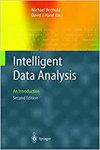A discrete equilibrium optimization algorithm for breast cancer diagnosis
IF 0.8
4区 计算机科学
Q4 COMPUTER SCIENCE, ARTIFICIAL INTELLIGENCE
引用次数: 0
Abstract
Illness diagnosis is the essential step in designating a treatment. Nowadays, Technological advancements in medical equipment can produce many features to describe breast cancer disease with more comprehensive and discriminant data. Based on the patient’s medical data, several data-driven models are proposed for breast cancer diagnosis using learning techniques such as naive Bayes, neural networks, and SVM. However, the models generated are hardly understandable, so doctors cannot interpret them. This work aims to study breast cancer diagnosis using the associative classification technique. It generates interpretable diagnosis models. In this work, an associative classification approach for breast cancer diagnosis based on the Discrete Equilibrium Optimization Algorithm (DEOA) named Discrete Equilibrium Optimization Algorithm for Associative Classification (DEOA-AC) is proposed. DEOA-AC aims to generate accurate and interpretable diagnosis rules directly from datasets. Firstly, all features in the dataset that contains continuous values are discretized. Secondly, for each class, a new dataset is created from the original dataset and contains only the chosen class’s instances. Finally, the new proposed DEOA is called for each new dataset to generate an optimal rule set. The DEOA-AC approach is evaluated on five well-known and recently used breast cancer datasets and compared with two recently proposed and three classical breast cancer diagnosis algorithms. The comparison results show that the proposed approach can generate more accurate and interpretable diagnosis models for breast cancer than other algorithms.乳腺癌诊断的离散均衡优化算法
疾病诊断是确定治疗方案的必要步骤。如今,医疗设备的技术进步可以产生许多特征,以更全面和有区别的数据来描述乳腺癌疾病。基于患者的医疗数据,利用朴素贝叶斯、神经网络和支持向量机等学习技术,提出了几种用于乳腺癌诊断的数据驱动模型。然而,生成的模型很难理解,因此医生无法解释它们。本工作旨在研究使用关联分类技术诊断乳腺癌。它生成可解释的诊断模型。本文提出了一种基于离散均衡优化算法(DEOA)的乳腺癌诊断关联分类方法,即离散均衡优化算法(DEOA- ac)。DEOA-AC旨在直接从数据集生成准确且可解释的诊断规则。首先,将数据集中所有包含连续值的特征离散化。其次,对于每个类,从原始数据集创建一个新的数据集,并且只包含所选类的实例。最后,对每个新数据集调用新提出的DEOA来生成最优规则集。DEOA-AC方法在五个已知的和最近使用的乳腺癌数据集上进行了评估,并与最近提出的两种和三种经典乳腺癌诊断算法进行了比较。对比结果表明,该方法比其他算法能够生成更准确、可解释的乳腺癌诊断模型。
本文章由计算机程序翻译,如有差异,请以英文原文为准。
求助全文
约1分钟内获得全文
求助全文
来源期刊

Intelligent Data Analysis
工程技术-计算机:人工智能
CiteScore
2.20
自引率
5.90%
发文量
85
审稿时长
3.3 months
期刊介绍:
Intelligent Data Analysis provides a forum for the examination of issues related to the research and applications of Artificial Intelligence techniques in data analysis across a variety of disciplines. These techniques include (but are not limited to): all areas of data visualization, data pre-processing (fusion, editing, transformation, filtering, sampling), data engineering, database mining techniques, tools and applications, use of domain knowledge in data analysis, big data applications, evolutionary algorithms, machine learning, neural nets, fuzzy logic, statistical pattern recognition, knowledge filtering, and post-processing. In particular, papers are preferred that discuss development of new AI related data analysis architectures, methodologies, and techniques and their applications to various domains.
 求助内容:
求助内容: 应助结果提醒方式:
应助结果提醒方式:


